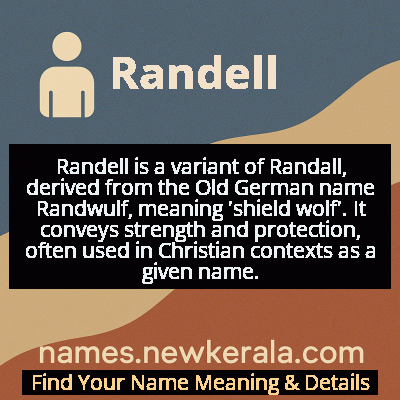Randell Name Meaning & Details
Origin, Popularity, Numerology Analysis & Name Meaning of Randell
Discover the origin, meaning, and cultural significance of the name RANDELL. Delve into its historical roots and explore the lasting impact it has had on communities and traditions.
Name
Randell
Gender
Male
Origin
Christian
Lucky Number
3
Meaning of the Name - Randell
Randell is a variant of Randall, derived from the Old German name Randwulf, meaning 'shield wolf'. It conveys strength and protection, often used in Christian contexts as a given name.
Randell - Complete Numerology Analysis
Your Numerology Number
Based on Pythagorean Numerology System
Ruling Planet
Jupiter
Positive Nature
Optimistic, inspirational, and creative.
Negative Traits
Scattered, exaggerating.
Lucky Colours
Yellow, gold, purple.
Lucky Days
Thursday.
Lucky Stones
Yellow sapphire.
Harmony Numbers
1, 2, 9.
Best Suited Professions
Arts, writing, communication.
What People Like About You
Creativity, optimism.
Famous People Named Randell
Randell Foster
American diplomat
Served as U.S. Consul General to Bermuda and held various diplomatic positions across Europe and Asia
Randell Mills
Scientist and inventor
Founded BlackLight Power and developed controversial theories in quantum mechanics and energy production
Randell T. Schriver
Government official
Served as Assistant Secretary of Defense for Indo-Pacific Security Affairs and Deputy Assistant Secretary of State
Randell L. Mills
Business executive
CEO of various technology companies and contributor to semiconductor industry development
Name Variations & International Equivalents
Click on blue names to explore their detailed meanings. Gray names with will be available soon.
Cultural & Historical Significance
In Christian contexts, while not directly biblical, Randell gained acceptance through its association with virtuous qualities valued in Christian tradition—protection, loyalty, and strength in defense of community. The name's components align with Christian values of being both 'wise as serpents and harmless as doves,' combining strategic intelligence with protective instincts. Throughout English history, various Randells have appeared in church records, military rolls, and civic documents, indicating the name's steady presence across social classes. The name's journey from Germanic warrior name to English surname to modern given name illustrates the dynamic nature of naming traditions and cultural adaptation across centuries.
Extended Personality Analysis
Individuals named Randell are often perceived as possessing a unique blend of protective instincts and strategic thinking, reflecting the name's 'wolf's shield' etymology. They typically demonstrate strong leadership qualities, loyalty to their social groups, and a natural inclination toward guardianship roles. The wolf symbolism suggests intelligence, social awareness, and pack mentality—traits that often manifest as strong family bonds and community involvement. Meanwhile, the shield element indicates defensive capabilities, reliability, and a tendency to protect others. Randells are frequently described as having a calm exterior that masks intense inner determination and resilience.
In social settings, Randells often serve as mediators and stabilizers, using their natural protective instincts to shield others from conflict or harm. They tend to be observant and analytical, carefully assessing situations before acting—a quality that makes them excellent problem-solvers and strategic planners. Their loyalty runs deep, and they typically form lifelong bonds with friends and family members. However, this strong protective nature can sometimes manifest as overprotectiveness or resistance to change. Career-wise, Randells often gravitate toward professions where they can exercise both their strategic thinking and protective instincts, such as law enforcement, military service, counseling, education, or management roles where they can mentor and guide others.
Modern Usage & Popularity
In contemporary naming practices, Randell maintains a modest but steady presence, typically ranking outside the top 1000 names in most English-speaking countries. The name experienced peak popularity in the mid-20th century, particularly in the United States and United Kingdom, but has since become more distinctive and uncommon. According to Social Security Administration data, Randell has not ranked in the top 1000 U.S. names since the 1980s, while the more common spelling 'Randall' has also declined but maintains slightly higher usage. Modern usage often favors the 'Randall' spelling variant, though Randell persists as a traditional alternative preferred by families seeking a more distinctive spelling. The name appeals to parents seeking strong, masculine names with historical depth but without overwhelming popularity. Current trends show Randell being used more frequently as a middle name or in families with strong English or Germanic heritage. Its rarity in the 21st century makes it an attractive choice for parents looking for traditional yet unique names that won't be shared by multiple classmates, while still carrying the weight of historical significance and meaningful etymology.
Symbolic & Spiritual Meanings
Symbolically, Randell represents the powerful combination of animal wisdom and protective strength. The wolf element symbolizes intelligence, loyalty, family bonds, and strategic hunting—qualities that translate to human characteristics of clever problem-solving, strong social connections, and determined pursuit of goals. In many cultural traditions, wolves represent teachers and pathfinders, suggesting that Randells may naturally assume mentoring roles or excel in guiding others through challenges. The shield component represents defense, security, and resilience, suggesting an individual who serves as a protector and stabilizer in their community. Throughout heraldry and symbolism, shields denote honor, protection, and the willingness to stand between danger and those one is sworn to protect.
Together, these elements create a symbolic profile of someone who balances aggressive pursuit of objectives with responsible guardianship of others. The name also carries undertones of medieval chivalry and noble service, evoking images of knights and loyal retainers who combined martial prowess with protective duty. In psychological terms, Randell symbolizes the integration of primal instincts with civilized protection—a person who can be both fierce in challenge and gentle in protection, making them natural leaders and guardians. This duality makes the name particularly resonant in modern contexts where individuals must navigate complex social and professional landscapes requiring both assertive action and protective consideration for others' wellbeing.

